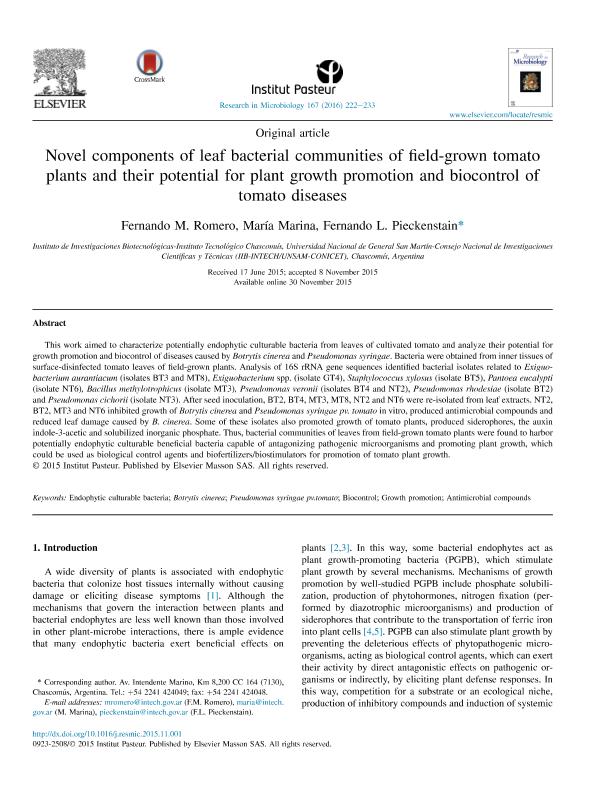Artículo
Novel components of leaf bacterial communities of field-grown tomato plants and their potential for plant growth promotion and biocontrol of tomato diseases
Fecha de publicación:
04/2016
Editorial:
Elsevier Science
Revista:
Research In Microbiology
ISSN:
0923-2508
Idioma:
Inglés
Tipo de recurso:
Artículo publicado
Clasificación temática:
Resumen
This work aimed to characterize potentially endophytic culturable bacteria from leaves of cultivated tomato and analyze their potential for growth promotion and biocontrol of diseases caused by Botrytis cinerea and Pseudomonas syringae. Bacteria were obtained from inner tissues of surface-disinfected tomato leaves of field-grown plants. Analysis of 16S rRNA gene sequences identified bacterial isolates related to Exiguobacterium aurantiacum (isolates BT3 and MT8), Exiguobacterium spp. (isolate GT4), Staphylococcus xylosus (isolate BT5), Pantoea eucalypti (isolate NT6), Bacillus methylotrophicus (isolate MT3), Pseudomonas veronii (isolates BT4 and NT2), Pseudomonas rhodesiae (isolate BT2) and Pseudomonas cichorii (isolate NT3). After seed inoculation, BT2, BT4, MT3, MT8, NT2 and NT6 were re-isolated from leaf extracts. NT2, BT2, MT3 and NT6 inhibited growth of Botrytis cinerea and Pseudomonas syringae pv. tomato in vitro, produced antimicrobial compounds and reduced leaf damage caused by B. cinerea. Some of these isolates also promoted growth of tomato plants, produced siderophores, the auxin indole-3-acetic and solubilized inorganic phosphate. Thus, bacterial communities of leaves from field-grown tomato plants were found to harbor potentially endophytic culturable beneficial bacteria capable of antagonizing pathogenic microorganisms and promoting plant growth, which could be used as biological control agents and biofertilizers/biostimulators for promotion of tomato plant growth.
Archivos asociados
Licencia
Identificadores
Colecciones
Articulos(CCT - LA PLATA)
Articulos de CTRO.CIENTIFICO TECNOL.CONICET - LA PLATA
Articulos de CTRO.CIENTIFICO TECNOL.CONICET - LA PLATA
Citación
Romero, Fernando Matias; Marina, María; Pieckenstain, Fernando Luis; Novel components of leaf bacterial communities of field-grown tomato plants and their potential for plant growth promotion and biocontrol of tomato diseases; Elsevier Science; Research In Microbiology; 167; 3; 4-2016; 222-233
Compartir
Altmétricas




